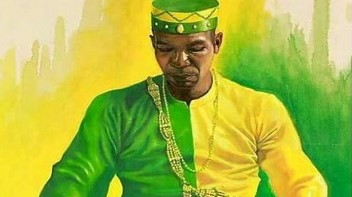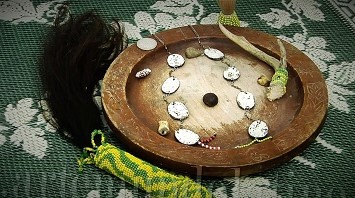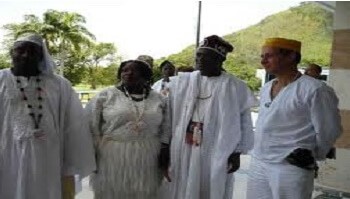All About Babalawo: Learn how to greet him, what his power is in the religion, what jobs he can do for you, the steps to become a Babalawo.
The Babalawo, or Babalao, is a well-known title in the Yoruba religion given to the priests of Orunmila or Orula. They are those who possess wisdom through the divination system known as Ifa. They know the present, the passing of time, and the future.
They are one of the most important people in the Yoruba religion and can perform Ifa consultations on the divination board. Now we will go into more depth about Babalawos. Although many consider them to be evil, this is not necessarily the case.
What is a Babalawo?
In addition to having the opportunity to see the future, present, and past through Ifa, he is known as the father of secrets.
Babalawos are recognized as clerics and leaders in the Yoruba community. The Awo serves as a spiritual advisor to his clients. He can also help you meet your tutelary Orisha.
Both women and men could be priests in the Yoruba tradition. Women are known as Iyaonifa.
Where do they come from?

It is known as those who believe in Ifa and also practice the ways of the Yoruba ancestors when there is a problem or an imbalance with something particular.
However, people don’t only go to the Babalawo when there is a problem, but also when they want to make a very important decision in life.
Babalawos honor Olofin, the nature of the world, and the ancestors. This is done every morning. Yoruba priests, like priests of other religions, honor and pray to God through Ifa.
How do you greet them?
As in all world religions, these figures should be revered and respected. As spiritual masters, they are associated with a great deal of ritual and symbolism.
- Adopt positions that show obedience and respect for their figure. Verbally, phrases should be expressed in the Yoruba language.
- If you are initiated into the religion, adopt a flexible position.
- Place your right knee on the ground, the fingers of your right hand on the floor, and bow your head.
- You should say the following: Iboru Iboya, Ibosheshe! After doing this, wait for the babalawo to greet you and touch your shoulders as a sign of permission for you to stand.
How does a godfather consult?
Through Ifá, the babalawo can predict the future, see your past, and understand the present. He uses the method of communication with Orunmilla.
- The divination chain called Opele.
- Sacred Ikin seeds can also be used on the divination board.
What jobs can they do?

There are a number of things that babalawos can do as priests of the Yoruba religion. We’ll tell you some of them now.
- They are the leaders of the most important ceremonies of Santeria. They are sacrosanct and inviolable. They must be highly respected.
- They deliver the Eshu, that is, the deity that can only be received through Ifa.
- They can give or place the ilde of Orula. This keeps the iku away from whoever has it.
- They perform divination ceremonies with chains (ekule) or royal palm fruits (ikines). They can give advice.
- They can deliver Ikofa or Awofaka in ceremonies by the hand of Orula.
- They assign or determine the orsishas who will be tutors for each person in the religion. Since Orunmila is an eyewitness to the creation of the world, he has that right.
- They have the power to consecrate other babalawos and intervene in that person’s teaching process.
- He participates in all the santero ceremonies, such as sacrifices, mat ebbo, or entrance ebbo.
What powers do they have?
In addition to the religious work they can do, Babalawos possess a series of powers or abilities.
- They are intermediaries between the Orishas and humans, offering worship and sacrifices.
- They are diviners, especially the Ifá priests. They master the main instruments of divination.
- They conduct and direct trials to create a greater sense of morality.
- They prepare charms, amulets, or other items typical of the spiritual world in which they reside.
- This role is hereditary, in the case of Ifá. This is the case with Orisha Oko, where it is obligatory. The family always maintains the emblem related to the god, which is a stick or iron stake.
- In each family, there is always a member who takes on the role of Babalawo, without interfering with family practices.
What should a Babalawo not do?
Although they possess a series of powers in the Yoruba religion, there are a number of restrictions within the religious work they must perform and things they cannot do in their daily lives.
Now we will discuss some of these prohibitions for babalawos:
- They cannot give or deliver Orishas that do not belong to the warriors. They also cannot give to a certain group such as Osain Olokun and Oduduwa.
- Under no circumstances can they perform divination ceremonies with Diloggún.
- They cannot deliver Elekes of Osha; these priests cannot do that.
- People cannot be initiated into Kariosha.
- One of the sexual prohibitions is that they cannot be homosexual.
Steps to Becoming a Babalawo
One of the main characteristics of becoming a Babalawo is having a deep understanding of the culture and wisdom of the Yoruba religion.
- It is important to acquire the necessary knowledge. Conduct an in-depth literary and bibliographical study. This can be done in many ways. In some cases, by studying for a long time alongside elders or lagguas of the religion.
- On the other hand, one must receive the Hand of Orula. This is one of the main steps in the ceremonial world. It helps create and refine the connection with Orumilla, the relationship with the power of the deity. This allows the person to connect with the saint of wisdom and with the path they are willing to follow.
- Performing the Igboodu ceremony, that is, becoming Ifa. Here, the person receives the ase of Ifa, to be guided in tasks as a priest.
- Performing the Oluwos, which is related to when initiates become saints. This is a ceremony related to Santeria. Here the priests have a crowned saint, and they ascend to the position of Babalawos.
Difference between a Babalawo and a Santero

Although, in a more traditional sense, both are considered priests of the Yoruba religion, each has very limited skills and tasks to perform. However, both figures can work together and complement each other in many Santeria ceremonies.
Now we will discuss the most important differences between the two priests:
- Babalawos: Only heterosexual men are allowed. Many people are excluded. Furthermore, if you want to become a Babalawo, you must possess the Hand of Orula and perform the Ifá ritual. For this, you must have a crowned saint. On the other hand, you can only perform the ritual to a limited group and in an Ifá manner when you become a saint, which is a variation of the rituals and rituals. Divinations are only performed with elements specific to the religion, such as the ekuele and ikines, which are provided by the Orula council.
- Santeros: There are no exclusions based on gender or sexual preference. To be initiated into the religion, you must have elekes of osha, the Hand of Orula, and Kariosha. After this process, if you are a man, you can become a Babalawo. This does not happen the other way around. Santeros, on the other hand, have the ability to donate all the saints they have in their possession without any restrictions unless otherwise directed by the Ita or the council of the saint. Additionally, they can perform divination ceremonies with the Obbi and the Diloggun, or snails, which are given to the council of any of the saints.
Although they are not the main priests of the Yoruba religion, Babalawos are fundamental elements in the ceremonies and main practices of Santeria. Therefore, it is important to understand their role and their position as priests in depth.
